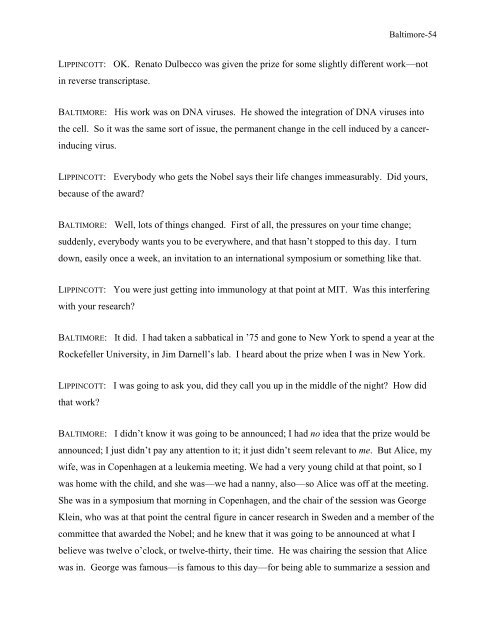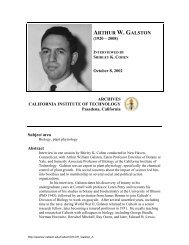Interview with David Baltimore - Caltech Oral Histories
Interview with David Baltimore - Caltech Oral Histories
Interview with David Baltimore - Caltech Oral Histories
Create successful ePaper yourself
Turn your PDF publications into a flip-book with our unique Google optimized e-Paper software.
<strong>Baltimore</strong>-54<br />
LIPPINCOTT: OK. Renato Dulbecco was given the prize for some slightly different work—not<br />
in reverse transcriptase.<br />
BALTIMORE: His work was on DNA viruses. He showed the integration of DNA viruses into<br />
the cell. So it was the same sort of issue, the permanent change in the cell induced by a cancerinducing<br />
virus.<br />
LIPPINCOTT: Everybody who gets the Nobel says their life changes immeasurably. Did yours,<br />
because of the award<br />
BALTIMORE: Well, lots of things changed. First of all, the pressures on your time change;<br />
suddenly, everybody wants you to be everywhere, and that hasn’t stopped to this day. I turn<br />
down, easily once a week, an invitation to an international symposium or something like that.<br />
LIPPINCOTT: You were just getting into immunology at that point at MIT. Was this interfering<br />
<strong>with</strong> your research<br />
BALTIMORE: It did. I had taken a sabbatical in ’75 and gone to New York to spend a year at the<br />
Rockefeller University, in Jim Darnell’s lab. I heard about the prize when I was in New York.<br />
LIPPINCOTT: I was going to ask you, did they call you up in the middle of the night How did<br />
that work<br />
BALTIMORE: I didn’t know it was going to be announced; I had no idea that the prize would be<br />
announced; I just didn’t pay any attention to it; it just didn’t seem relevant to me. But Alice, my<br />
wife, was in Copenhagen at a leukemia meeting. We had a very young child at that point, so I<br />
was home <strong>with</strong> the child, and she was—we had a nanny, also—so Alice was off at the meeting.<br />
She was in a symposium that morning in Copenhagen, and the chair of the session was George<br />
Klein, who was at that point the central figure in cancer research in Sweden and a member of the<br />
committee that awarded the Nobel; and he knew that it was going to be announced at what I<br />
believe was twelve o’clock, or twelve-thirty, their time. He was chairing the session that Alice<br />
was in. George was famous—is famous to this day—for being able to summarize a session and

















